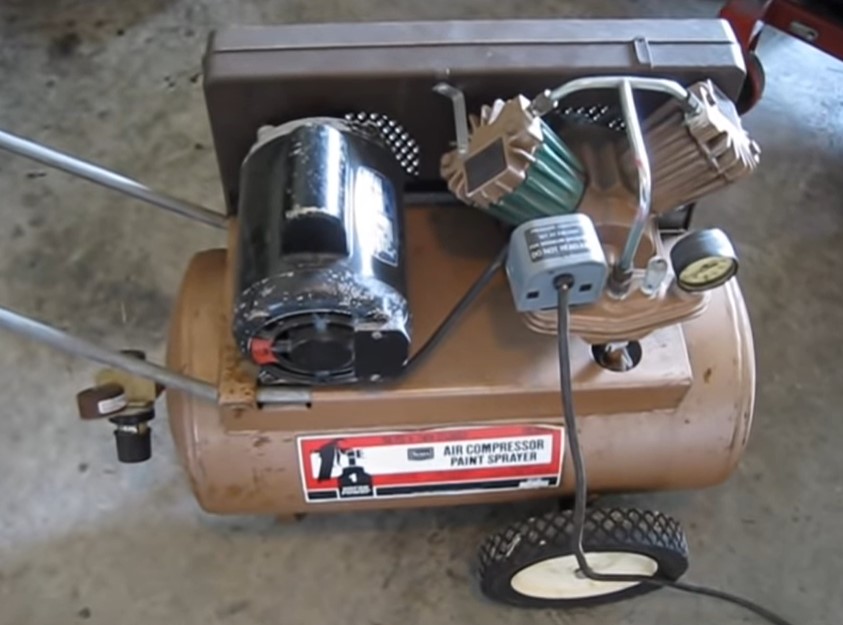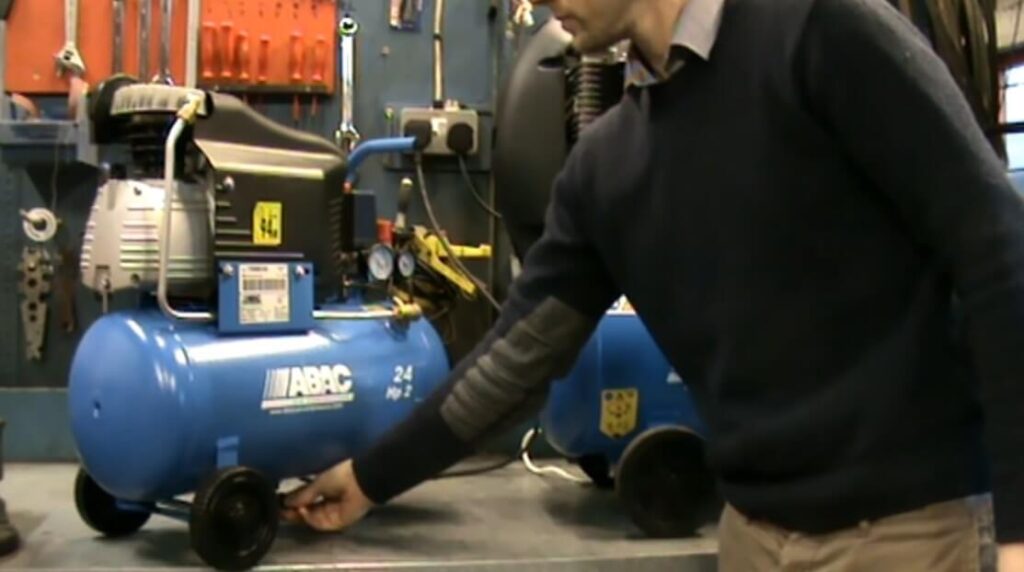Failing to drain an air compressor can cause damage to its internal components and reduce its overall lifespan. As moisture accumulates in the tank over time, it can cause rust and corrosion, which can lead to leaks and other problems.
Regularly draining the compressor helps extend its lifespan and prevent costly repairs. As an air compressor owner, it is essential to understand the importance of proper maintenance.
Today, we’re diving into the fascinating world of air compressors. Ever wondered what happens if you forget to give your compressor a little TLC by draining it? Well, buckle up for a ride on the maintenance express!

Do Air Compressors Need To Be Drained?
Yes, to get optimum performance from an air compressor, it is essential to regularly drain it.
An air compressor is a powerful tool that can be found in a variety of workplaces. From inflating tires to powering pneumatic tools, air compressors are a crucial part of many industries.
However, like any tool, an air compressor requires regular maintenance to function at its best. One of the most important maintenance tasks for an air compressor is draining it regularly.
To better understand whether it needs to drain or not, we will now go over the function of an air compressor and how excess moisture affects its performance.
The Function Of An Air Compressor
An air compressor is a machine that compresses air and stores it in a tank. When you use an air compressor, air is drawn into the tank and compressed, increasing its air pressure. When the pressure reaches a certain level, the compressor turns off.
The compressed air is then stored in the tank until it is needed. An air compressor can generate a significant amount of pressure and can be used for a wide range of tasks, such as inflating tires or powering air tools.

How Does Excess Moisture Affect the Performance of Your Air Compressor?
When you use an air compressor, it draws in moisture from the surrounding air and compresses it along with the air.
This moisture can cause a number of problems for your compressor, including:
- Corrosion: Moisture can cause the inside of the tank to rust, which can weaken the tank and eventually cause it to fail.
- Reduced effectiveness: Moisture can cause the tank to become clogged or the tools you are using to become less effective.
- Increased wear and tear: Moisture can cause damage to the internal components of the compressor, leading to more wear and tear over time.
- Safety hazards: If the tank becomes weakened due to rust or corrosion, it can be a safety hazard, as it may burst under pressure.

Therefore, it is essential to drain your air compressor regularly to maintain its performance and ensure its longevity. By taking the time to properly maintain your air compressor, you’ll be able to complete tasks with ease and avoid costly repairs and downtime.
Remember to follow the manufacturer’s recommended maintenance schedule, and if you have any questions about your air compressor, reach out to a professional for assistance.
How Often To Drain Air Compressor Tank?
Air compressors are an essential part of many workplaces and households, and proper maintenance is crucial to ensure they function correctly and last a long time. One of the most crucial aspects of air compressor maintenance is draining them regularly.
But how often should you drain your air compressor to keep it running smoothly? Let’s find out.
Frequency Of Draining Your Air Compressor
The frequency at which you should drain an air compressor depends on several factors, such as the size of the compressor, frequency of use, and environmental conditions.
Typically, it is recommended that you drain your air compressor after every use to ensure that there is no moisture buildup in the tank.
However, this may not be practical in many cases, where the compressor is used frequently.
Factors To Consider When Determining Drain Intervals
Several factors come into play when determining how often to drain your air compressor. Here are some of the most important ones:
- Compressor size: The size of your compressor tank determines how much moisture it can hold before it needs to be drained. If you have a smaller compressor, you may need to drain it more frequently.
- Humidity: High-humidity environments result in more condensation inside the compressor tank. If you live in a humid climate, you will need to drain your compressor more often.
- Frequency of use: Frequent use of your compressor leads to more condensation inside the tank. If you use your compressor often, you will need to drain it more frequently.
- Usage duration: If you use your compressor for extended periods, there will be more condensation buildup. You will need to drain it more frequently.
- Maintenance schedule: Periodic maintenance is essential for keeping your air compressor in good working condition. A well-maintained compressor requires less frequent draining.
Seasonal Recommendations
The frequency of draining your air compressor can also vary by season. During the summer months, when humidity is high, you may need to drain your compressor more often.
On the other hand, in the winter, when the air is drier, condensation is less of an issue, and you may be able to get away with draining your compressor less frequently.
Regularly draining your air compressor is essential to keep it functioning correctly and prevent expensive repairs.
By considering the factors outlined above, you’ll be able to determine the best draining schedule for your compressor.
Should I Drain My Air Compressor After Every Use?
Yes, it is generally recommended to drain your air compressor after every use to prevent moisture buildup in the tank, which can lead to corrosion and reduce the lifespan of the compressor.
How To Drain Air Compressor?
Your air compressor is an essential tool that helps you with various tasks around your house or workplace. But, if you’re not draining it regularly, it could lead to a series of issues that could damage your compressor and reduce its lifespan.
Here’s a step-by-step guide on how to drain it effectively.
Tools You’ll Need To Drain Your Air Compressor
Having the right tools can make draining your air compressor go smoothly. Here are the tools you need:
- Drain valve (a small brass or chrome valve located at the bottom of the tank)
- Drain hose (flexible and long enough to extend the water out of harm’s way)
- Bucket (optional; to catch the water drained from the compressor)
- Pliers (optional; to better grip and turn the drain valve)
Step-By-Step Guide To Draining Your Air Compressor
- First, make sure to unplug your compressor from the power source to prevent any electrocution hazards.
- Next, release the pressure from the air compressor by turning the tank pressure release valve counterclockwise. Allow the air compressor to release all the air pressure.
- Locate the drain valve—a small brass or chrome valve located at the bottom of the tank.
- Position your compressor so that the drain valve is closest to the ground.
- Attach a drain hose to the drain valve and ensure that it is placed away from any plants or areas that could be damaged by water.
- Slowly open the valve and let all the water drain out.
- After draining all the water from the compressor, close the valve, remove the hose, and wipe the dry exterior of the drain valve.
- Finally, set the compressor upright and plug it back in.

Draining your air compressor is a simple process that can help you keep your compressor functioning correctly for a longer time. Make it a routine to drain your air compressor regularly, especially after large projects or long periods of usage.
By doing so, you’ll ensure your compressor remains in good condition, preventing costly repairs and replacements down the road.
Automatic Drain for Air Compressor
An automatic drain for an air compressor is a device designed to efficiently remove accumulated condensate or moisture from the compressed air system without manual intervention.
Moisture can accumulate in the compressor tank during operation, and if not properly drained, it can lead to corrosion and damage to the system components.
An automatic drain typically uses a float or sensor mechanism to detect the level of condensate in the tank. When the condensate reaches a certain level, the drain valve opens automatically, allowing the water to be expelled from the system.
This helps in maintaining optimal performance, preventing corrosion, and extending the life of the air compressor.
Electronic Drain Valve for Air Compressor
An electronic drain valve for an air compressor is a type of automatic drain that utilizes electronic controls for precise and efficient condensate removal.
Unlike traditional mechanical drains, electronic drain valves are equipped with sensors and a control unit that can be programmed to open and close at specific intervals or in response to the moisture level in the system.
The electronic control ensures that the drain valve operates only when necessary, reducing energy consumption and preventing unnecessary loss of compressed air.
These valves are often preferred in industrial settings where precise control over condensate removal is crucial for maintaining the integrity of the compressed air system and the equipment it serves.
Can Air Compressor Tank Explodes If Not Drain Regularly?
While the likelihood of an air compressor tank exploding due to not draining regularly is low, there is a potential risk. If the tank accumulates moisture over time and corrosion occurs, it can weaken the tank’s integrity.
In rare cases, this weakened structure could lead to a catastrophic failure, resulting in a burst or explosion.
To minimize this risk and ensure the safety and longevity of the compressor, it is crucial to drain the tank regularly to prevent corrosion and moisture buildup.
Tips and Tricks for Effective Air Compressor Maintenance
Become a mini-mechanic! We’ve got tips and tricks to make maintaining your air compressor a breeze. Spoiler alert: It involves love and a bit of magic!
Here are some essential tips for maintaining your air compressor.
Cleaning Air Filters
One of the easiest and most crucial maintenance tasks for your air compressor is cleaning the air filters. The air filters prevent dust, debris, and other particles from entering the compressor.
Over time, the filters clog up, which can lead to poor performance and even damage to the compressor.
To avoid such issues, you should clean the filter regularly, at least once every three months, depending on how frequently you use the compressor.
Here are the steps for cleaning the air filters:
- Turn off the compressor and unplug it from the outlet.
- Remove the air filter and check for any visible damage.
- Clean the filter by gently brushing off any debris and dust.
- If the filter is too dirty, wash it with water and let it dry completely before reinstalling it.
Proper Storage Of Your Air Compressor
Proper storage of your air compressor is essential to avoid damage and prolong its lifespan.
Here are some tips for storing your compressor:
- Keep your compressor in a clean, dry, and cool place.
- When not in use, cover the compressor with a protective cover.
- Do not store your compressor on the floor, as it can collect dust and debris and also be a tripping hazard.
- Drain all the water from the tank before storing it to prevent rust and corrosion.
Regular Check-Ups And Maintenance
To keep your air compressor running smoothly and avoid costly repairs, you should perform regular check-ups and maintenance.
Here are some maintenance tasks you should perform:
- Check the compressor oil level and top it up if needed.
- Inspect the hoses and connections for any leaks or damages, and replace them if needed.
- Check the pressure relief valve for proper functioning.
- Check the tank for any rust or corrosion and clean it if needed.
By adhering to these tips, you can keep your air compressor in excellent condition and get the most out of it. Remember to always read the manufacturer’s instructions for specific maintenance requirements.
Common Misconceptions About Draining Air Compressors
Let’s bust some myths! Draining isn’t a chore; it’s a superhero duty. We’ll unravel the truth behind common misconceptions and set the record straight.
Myth 1: Draining the compressor is unnecessary if it’s not being used.
Even when idle, moisture can accumulate in the tank due to condensation. This can lead to rust, corrosion, and even damage to the internal components.
Myth 2: Draining the tank manually every now and then is enough.
Condensation happens constantly, and manual draining can be unreliable. Automatic drain valves are designed to expel condensate efficiently and consistently.
Myth 3: All automatic drain valves are created equal.
There are different types of automatic drains, like solenoid operated or timed drains. Choosing the right one depends on factors like pressure and ambient temperature.
Myth 4: Draining wastes compressed air.
Automatic drains are designed to expel condensate only, not compressed air. They operate efficiently to minimize air loss.
By understanding these misconceptions, you can ensure your air compressor system is properly maintained and operates at its best.
FAQs: What Happens If You Don’t Drain Air Compressor?
Is it OK to leave air compressor filled?
No, it is not advisable to leave an air compressor filled for extended periods. Draining the compressor regularly is recommended to prevent moisture buildup, which can lead to corrosion and damage to the system.
How Often Should You Drain Air Compressor?
Drain your air compressor after every use, or at least once a day if you use it frequently.
How Do You Know When To Drain Your Air Compressor?
You should drain your air compressor when the tank pressure gauge indicates zero pressure, or if there is water or moisture buildup.
Can You Over-Drain an Air Compressor?
No, you cannot over-drain an air compressor. It is better to drain it more frequently than not enough.
What Can You Use to Drain an Air Compressor?
You can use a drain valve, a manual valve, or an automatic drain valve to drain an air compressor.
What happens when You don’t drain your air compressor
Conclusion
And there you have it, air compressor users! Draining your air compressor is like giving it a superpower boost. Neglecting to do so can lead to some unwanted consequences. Not only can rust and corrosion damage the compressor’s internal components, but it can also cause a decrease in airflow, resulting in insufficient tool performance.
So, keep it happy, and it’ll always have your back in all your adventures.
Ready to be the superhero of your workshop? Follow our guide, show some love to your air compressor, and let the adventures begin! Don’t forget to share your compressor tales with us.
Recent Posts
Woodworking in 2025 is all about efficiency, precision, and smart technology. Whether you're a beginner or a seasoned craftsman, having the right tools can make all the difference. Here are the top 7...
Ever tried drilling into a piece of wood only to end up with a splintered mess or a wobbly hole? Yeah, it's more common than you think. Wood might seem like an easy material to work with, but...

